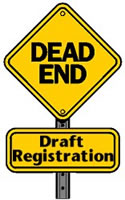
ACTION ALERT:Attempt to Link Draft Registration with Driver's License Defeated in California
|
|
|||
|
In its third attempt to make draft registration a condition for males to receive a driver's license or DMV ID card in California, Selective Service found itself going down another dead-end road. The legislation, Senate Bill 1276, was weakened with amendments before it passed the Senate Transportation Committee, and then it went to the Senate Appropriations Committee where it was held in suspense on May 23. This effectively killed the proposal for the current legislative session and handed Selective Service its third defeat on the issue in as many years. While SB 1276 was still at the Transportation Committee, the bill was amended to remove language that would have made draft registration automatic for males between the ages of 18 and 26 when they applied for either a driver's license or DMV ID card. The amendment left draft registration as an option that could be selected by license/ID card applicants, and a stern warning about the penalties for not registering would have been included in license/ID card application forms. Changing the bill to make draft registration merely an "opt-in" choice did not give it enough momentum, however, to survive the appropriations committee, where the estimated cost of the proposal for the first two years was set at $594,000 (with up to $20,000 reimbursable by federal funds). Recently in New Hampshire, a similar "opt-in" amendment to a driver's license bill allowed the proposal to get through that state's legislature. Selective Service claimed victory there, even though the draft agency has stated that it opposes bills that only make draft registration optional when men apply for a license. Opposition to the California bill came from COMD, Friends Committee on Legislation-California (Sacramento), Center on Conscience and War (Washington, DC) and Resource Center for Nonviolence (Santa Cruz), with the regional Auto Club offices of Northern and Southern California voicing opposition to any expenditure of state transportation funds for the draft registration proposal. Phone calls, faxes and letters from individuals were also extremely important. As of July 3, 2002, Selective Service claimed that 24 states, two territories, and the District of Columbia had passed laws establishing some linkage between draft registration and driver's licenses. The states and territories Selective Service lists are: Oklahoma, Delaware, Arkansas, Utah, Georgia, Hawaii, Alabama, Florida, Colorado, Texas, Louisiana, Illinois, Ohio, South Dakota, Mississippi, Idaho, Virginia, Wisconsin, New Hampshire, West Virginia, Tennessee, South Carolina, Maryland, Rhode Island, the Commonwealth of the Northern Mariana Islands, and the Virgin Islands. In addition, bills were awaiting governors' signatures in Missouri and New York. In North Carolina and Pennsylvania, bills had passed one legislative house. Selective Service's list apparently does not make a distinction between new laws that make draft registration mandatory as a condition for receiving a license and those, like New Hampshire's, that merely remind people to register and offer them an opportunity to do so when applying for a license. Selective Service says that driver's license legislation is under consideration in Guam and Massachusetts, and it is seeking sponsors for bills in other states. A sponsor is being sought in New Jersey, according to an anti-draft activist there who plans to organize opposition (for information, contact Bob Goldbeck: rgoldbeck631.@comcast.net). Since California is a large state with one of the lowest draft
registration compliance rates, it is expected that Selective Service
will continue trying to get its proposal through the California
legislature. With continued commitment from activists, the same
pattern of defeats can continue. For more information and updates, contact: Committee Opposed to Militarism and the Draft, 619-265-1369, or the Friends Committee on Legislation of California, 916-443-3734. |
||||
